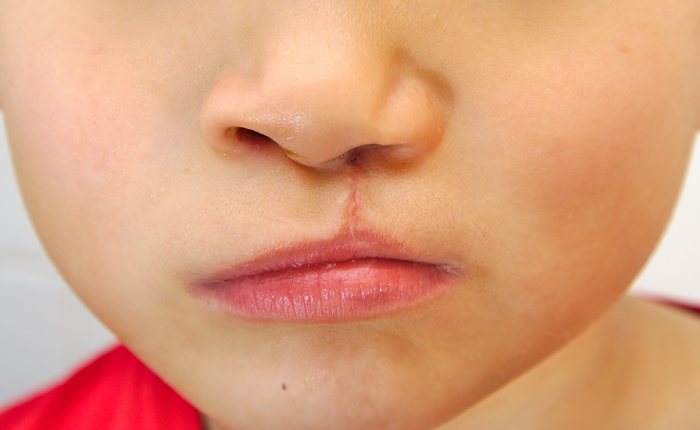Cleft Palate Surgery in MRC Nagar, Chennai
Overview of Cleft Repair Surgery
A cleft palate or cleft lip surgery is effective in treating birth flaws in children. Your child may develop a cleft palate when the sides of the roof of the mouth fail to join together appropriately, leaving an opening or gap in between.
The palate is the roof of the mouth, which is also the base of your nose. It has two parts, which are the hard palate and the soft palate. A cleft lip is when there is a split in the upper lip of your child. For such conditions, you need to consult a plastic surgeon near you to close the gap.

What is A Cleft Repair Procedure?
A cleft repair surgery is a procedure performed to restore the normal appearance and function of the body part involved. Doctors recommend early correction of cleft palate and cleft lip, typically between 8 and 12 months of age. It prevents your child from future health problems, and speech also improves significantly.
What Causes A Cleft Palate and A Cleft Lip?
Factors that may increase the likelihood of this defect include:
- Exposure to specific substances like smoking, alcohol consumption, certain medicines.
- Gaining weight during pregnancy.
- Family history of this issue.
- Environmental factors.
- If the mother suffers a grave illness during pregnancy.
- Vitamin deficiencies.
Who Qualifies for A Cleft Repair Surgery?
Children with a cleft palate or cleft lip, who suffer from health issues like the following, require a cleft repair surgery:
- Face difficulty while eating or drinking.
- Have hearing troubles.
- Speech problems.
- Have a nasal effect while talking.
- Chronic ear infections.
Why is this Procedure Conducted?
It is highly challenging to breastfeed your child with a cleft palate. It is because there is no suction if there is a hole in the roof of the mouth. Further, as your child grows, eating and drinking also become problematic.
Another crucial reason is speech. A child with a cleft palate cannot control the air rushing out from the nose. As a lot of air leaks out of the nose, speaking can become incomprehensible. Hence it becomes tricky for the child to learn to speak fluently. A pediatric plastic surgeon near you can rectify this problem.
Request an appointment at Apollo Spectra Hospitals, MRC Nagar, Chennai
Call 1860 500 2244 to book an appointment.
How is the Procedure Done?
A pediatrician or a child specialist monitors your child’s vitals while performing the procedure.
A cleft palate repair and a cleft repair surgery involve the following steps:
- Cleft palate repair (palatoplasty
- Surgeons perform this procedure under general anesthesia so your child won’t feel any pain.
- With the help of specialized instruments, the surgeon makes incisions on both sides of the cleft.
- Then the surgeon works on reconstructing the palate by repositioning the tissues and muscles.
- Finally, the surgeon closes the incisions with sutures.
- Cleft lip repair (cheiloplasty)
- By making incisions on both sides of the cleft, the surgeon builds flaps of tissues.
- The surgeon then stitches the flaps along with the lip muscles.
The surgeon may place ear tubes in your child’s eardrum to lessen the risk of ear fluid build-up that can cause hearing loss.
How can Your Child Benefit from a Cleft Repair Surgery?
A defective palate can indeed affect your child’s health. Doctors highly recommend cleft repair surgery so that every child with this problem can lead a happy and healthy life.
A cleft lip or cleft palate surgery enhances facial symmetry. Thus, the child can eat, drink, hear and talk comfortably. It also protects the child from other associated complications like ear infections, hindrance in growth, emotional and social challenges, and more.
Are there Any Risks or Complications after Cleft Repair Surgery?
If you notice any of the following signs in your child, contact the doctor right away:
- Fever higher than 101.4 F (38.56 C).
- Bleeding or smelly discharge from the surgical wound.
- Breathing difficulty.
- Change in skin color (grey, blue, or if your child looks pale).
- Redness, irritation, or swelling.
- Less urination than usual.
- Symptoms of dehydration, including dry mouth, low energy, sunken eyes.
- Wounds taking longer time to heal.
- Widening of scars.
Conclusion
It can be emotionally demanding for parents to have a child with a cleft palate, but the good news is that it is curable. It is a serious condition and can lead to multiple health problems in future and hence early correction is recommended. Consult a plastic surgeon near you to seek timely treatment.
At home, you can give noodles, vegetable purees, and anything soft or mashed. Do not use a straw, and be careful so that no food granules get stuck in the gap between the teeth and the palate.
A fistula is an opening that may appear after a cleft repair surgery. It is rare and results from poor recovery of the surgical wound. If the fistula is large, doctors recommend early surgery.
You can consider the following to reduce the risks:
- Avoid smoking and alcohol during pregnancy.
- Talk to a genetic counselor.Z
- Take prenatal vitamins.
Symptoms
Our Top Specialities
NOTICE BOARD
CONTACT US
CONTACT US
 Book Appointment
Book Appointment


.svg)
.svg)
.svg)
.svg)








